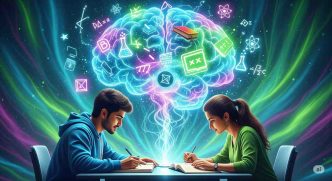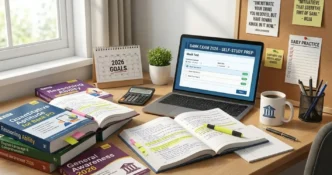Master the art of acing your tests with our ultimate guide on how to prepare for Education Exams effectively. Discover proven strategies for study plans, active learning, well-being, and more to boost your confidence and performance.
Introduction
The words “exam season” can evoke a sense of dread for students of all ages. Whether you’re facing standardized tests, final university papers, or crucial certification Education Exams, the pressure to perform can feel overwhelming. However, success in these assessments is not merely a product of innate intelligence; it is primarily the result of strategic, effective preparation. Knowing how to prepare for Education Exams effectively is a skill in itself—one that reduces anxiety, boosts confidence, and unlocks your true potential. This comprehensive guide will walk you through a step-by-step blueprint, from crafting a smart study plan to mastering the exam day itself, ensuring you are fully equipped to achieve your academic goals.
1. Forge a Strategic Study Plan: Your Roadmap to Success

The difference between effective studying and frantic, last-minute cramming is a well-structured plan. A study schedule acts as your personal roadmap, providing direction and preventing overwhelm.
Break Down the Syllabus and Prioritize
Your first step is to deconstruct the entire syllabus for your Education Exams. Identify all the topics and subtopics you need to cover. Categorize them based on:
- Weightage: Which topics carry the most marks?
- Difficulty: Which areas do you find most challenging?
- Familiarity: Which concepts are you already comfortable with?
This audit allows you to prioritize your time intelligently, dedicating more hours to high-weightage, high-difficulty areas.
Create a Realistic Timetable
Using your prioritization, draft a weekly study timetable. Be realistic about your available time and energy levels.
- Time Blocking: Allocate specific time blocks for each subject or topic.
- Balance: Avoid studying one subject for an entire day. Mixing subjects keeps your brain engaged.
- Schedule Breaks: The Pomodoro Technique (e.g., 25 minutes of focused study followed by a 5-minute break) is highly effective for maintaining concentration.
- Be Flexible: Life happens. Your schedule should be a guide, not a straitjacket. Allow for adjustments as needed.
2. Gather and Organize Your Resources
You cannot build a house without the right tools. Similarly, effective preparation for Education Exams requires having all your study materials organized and at hand.
Assemble Your Arsenal
Before you begin, ensure you have:
- Official Syllabus: The definitive guide to what will be tested.
- Textbooks and Class Notes: Your primary sources of information.
- Past Papers and Sample Questions: Crucial for understanding the exam format and question styles.
- Reference Books and Online Resources: For additional explanations or practice.
Create Consolidated Notes
Passively reading is ineffective. Actively create your own study notes. Summarize chapters, create mind maps, draw flowcharts, or use flashcards. The act of writing and synthesizing information dramatically improves retention and recall, which is fundamental for performing well in Education Exams.
3. Master Active Learning Techniques

Simply re-reading notes is a passive and often useless activity. To truly embed knowledge, you must engage with the material actively.
Embrace Retrieval Practice
This is the single most effective study technique. Instead of putting information into your brain, practice pulling it out. This can be done through:
- Self-Testing: Use flashcards or answer questions from the back of a textbook without looking at the answers.
- Practice Exams: The gold standard. Simulate exam conditions by timing yourself while completing past papers. This builds stamina, improves time management, and identifies knowledge gaps.
Try the Feynman Technique
Named after the physicist Richard Feynman, this technique involves explaining a concept in simple, plain language as if you were teaching it to a complete novice. If you struggle to explain it simply, you’ve identified a gap in your own understanding that needs revisiting.
4. Optimize Your Environment and Mindset
Your surroundings and mental state are just as important as the study techniques you use.
Design a Dedicated Study Space
Find a quiet, well-lit, and clutter-free area specifically for studying. Ensure your chair and desk are comfortable and that you have all necessary materials within reach. This signals to your brain that it’s time to focus whenever you enter this space.
Develop a Growth Mindset
Believe that your abilities can be developed through dedication and hard work. View challenging topics not as threats, but as opportunities to grow. Replace thoughts like “I’m bad at this subject” with “I haven’t mastered this subject yet.”
5. Prioritize Health and Well-being

Neglecting your health during exam preparation is a critical mistake. A healthy body supports a healthy, high-functioning mind.
Fuel Your Brain with Nutrition
What you eat directly impacts cognitive function. Avoid sugary snacks and junk food that lead to energy crashes. Opt for a balanced diet rich in:
- Omega-3s: Found in fish and nuts, great for brain health.
- Antioxidants: Found in berries and dark chocolate.
- Complex Carbohydrates: Found in whole grains, providing sustained energy.
- Stay hydrated! Dehydration can cause fatigue and headaches.
Never Compromise on Sleep
Sleep is not downtime; it is prime time for your brain. During sleep, your brain consolidates memories, transferring information from short-term to long-term storage. Pulling an all-nighter before your Education Exams is proven to be counterproductive, harming recall and cognitive performance. Aim for 7-9 hours of quality sleep per night.
Incorporate Physical Activity
Even a short 20-minute walk can work wonders. Exercise reduces stress, improves mood, and increases blood flow to the brain, enhancing your ability to concentrate and learn.
6. The Final Week and Exam Day Strategy
The final stretch requires a shift in strategy from learning new content to reinforcing what you already know.
The Week Before
- Review, Don’t Cram: Focus on reviewing your summarized notes, mind maps, and flashcards.
- Take More Mock Tests: Continue taking timed practice exams to stay sharp.
- Clarify Doubts: Use this time to get any last-minute questions answered by teachers or peers.
On the Day of the Exam
- Eat a Healthy Breakfast: Provide your brain with steady fuel.
- Arrive Early: Avoid any last-minute stress.
- Read Instructions Carefully: Once the exam begins, take a deep breath and carefully read all instructions and questions.
- Pace Yourself: Keep an eye on the time. Don’t spend too long on any single question. Mark difficult ones and return to them later.
7. Developing an Exam-Oriented Mindset

Success in Education Exams isn’t just about knowledge—it’s about approach. Develop a strategic mindset by:
- Visualizing success in your Education Exam
- Practicing positive self-talk related to your Education Exam preparation
- Viewing the Education Exam as an opportunity rather than a threat
- Building mental resilience through mock Education Exam simulations
Confidence Building Techniques
Boost your confidence for the Education Exam through:
- Regular self-assessment using Education Exam pattern questions
- Celebrating small victories in your Education Exam preparation journey
- Creating a pre-Education Exam ritual to establish familiarity and reduce anxiety
- Focusing on your progress rather than perfection in Education Exam preparation
Remember: Your preparation for the Education Exam includes both academic readiness and mental preparedness. A confident approach to your Education Exam can often make the difference between good and exceptional performance.
Frequently Asked Questions (FAQ)
Q1: When should I start studying for an Education Exam?
Begin preparing 4–6 weeks before your Education Exam to allow enough time for thorough review and practice.
Q2: What’s the best way to study for an Education Exam?
Use active recall: test yourself with flashcards or practice questions instead of just rereading notes.
Q3: How can I reduce exam anxiety?
Prepare well, practice deep breathing, use positive affirmations, and focus on one question at a time during the Education Exam.
Q4: Should I study alone or in a group?
Both help. Study alone to understand concepts deeply, and join a focused group to discuss tough topics and test your knowledge.
Q5: How useful are past papers?
Very. Past papers help you understand the format, pinpoint key topics, and practice timing for the Education Exam.
Conclusion: Your Pathway to Exam Success
Preparing for Education Exams effectively is a holistic process that extends far beyond memorization. It is a disciplined approach that combines strategic planning, active learning, a supportive environment, and unwavering self-care. By implementing the strategies outlined in this guide—from creating a realistic study plan to prioritizing sleep and managing exam day pressure—you transform exam preparation from a source of anxiety into an opportunity for personal growth and academic achievement. Remember, consistency is key. Start early, trust your process, and walk into your exam hall with the confidence that you have done the work required to succeed.







